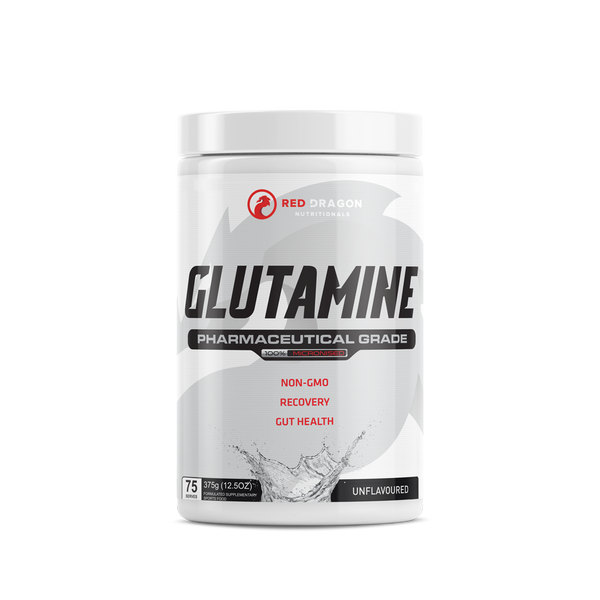Introduction: What is Glutamine?
Glutamine is a conditionally essential amino acid that performs a plethora of critical functions in the human body. In its natural form, L-glutamine, it aids in various physiological processes, including immune system regulation, gut health, and protein synthesis. This guide aims to offer an in-depth overview of glutamine’s benefits, its dietary sources, and its role in immune system function and exercise performance, among other aspects.

The Different Forms of Glutamine: L-Glutamine and D-Glutamine
Among amino acids, glutamine exists in two isoforms: L-glutamine and D-glutamine. The L-glutamine form is bioactive and widely found in foods and supplements. It is the primary form responsible for the multifaceted functions that glutamine performs in our body.

Natural Abundance: Where to Find Glutamine in Foods
Glutamine is abundantly present in a variety of foods. A standard diet may provide anywhere from 3 to 6 grams of glutamine per day. Animal products such as beef and eggs are excellent sources because of their high protein content.
- Eggs: Contain 4.4% of protein as L-glutamine (0.6 g per 100g)
- Beef: Offers 4.8% (1.2 g per 100g)
- Skim Milk: Provides 8.1% (0.3 g per 100g)
Plant-based foods can also provide glutamine, albeit in lower concentrations:
- Tofu: 9.1% (0.6 g per 100g)
- White Rice: 11.1% (0.3 g per 100g)
- Corn: 16.2% (0.4 g per 100g)

Glutamine and Immune Function
Glutamine serves as a critical energy source for various immune cells, including white blood cells. During stressful conditions like injury or illness, the body's glutamine production may be insufficient, leading to a compromised immune system. In such cases, a high-glutamine diet or glutamine supplementation is often recommended. Numerous studies have shown that glutamine supplementation can improve immune function and reduce infection rates, especially following surgeries or critical illnesses.

Glutamine's Crucial Role in Gut Health
The intestines are the largest component of the human immune system. Glutamine acts as a vital fuel for intestinal cells and aids in maintaining the intestinal barrier, thus preventing conditions like leaky gut. Its significance in intestinal health directly contributes to the overall efficacy of the immune system.

The Impact of Glutamine on Muscle Growth and Athletic Performance
Glutamine is often considered a muscle-building nutrient because of its role in protein synthesis. However, scientific evidence regarding its effectiveness in muscle gain and athletic performance is inconsistent. While some studies suggest that it may reduce muscle soreness and aid recovery, there is limited evidence to prove that it significantly impacts muscle mass or exercise performance.

Dosage and Safety Measures
The average dietary glutamine intake ranges from 3 to 6 grams per day. Supplementation studies have employed dosages as high as 45 grams per day without reporting significant adverse effects. Nonetheless, it is recommended to begin supplementation with a conservative dose of approximately 5 grams per day.

Takeaway
Glutamine is an incredibly versatile amino acid that plays significant roles in immune function, gut health, and potentially even exercise performance. While it is abundant in a variety of foods, supplementation may offer targeted benefits, particularly for those dealing with certain health conditions. However, before starting any supplementation regime, it’s crucial to consult with healthcare professionals to ensure that it aligns with your specific health needs and conditions.
FAQ's
Q1: What is Glutamine and what are its main functions in the body?
Glutamine is a conditionally essential amino acid that plays a vital role in several physiological processes. These include immune system regulation, gut health, and protein synthesis.
Q2: What are the different forms of Glutamine and which is more bioactive?
Glutamine exists in two isoforms: L-glutamine and D-glutamine. L-glutamine is the bioactive form and is primarily responsible for the various functions that glutamine performs in the human body.
Q3: Where can I find Glutamine naturally in my diet?
Glutamine is found in a variety of foods, predominantly in animal products like beef and eggs due to their high protein content. Plant-based foods like tofu, white rice, and corn also contain glutamine but in lower concentrations.
Q4: How does Glutamine affect immune function?
Glutamine serves as an essential energy source for various immune cells, including white blood cells. When the body is under stress, such as during illness or injury, its natural production of glutamine may be insufficient, potentially compromising the immune system. Supplementation can improve immune function and reduce infection rates.
Q5: What is the recommended dosage for Glutamine supplementation and is it safe?
The average dietary intake of glutamine is around 3 to 6 grams per day. For supplementation, studies have used dosages up to 45 grams per day without significant adverse effects. However, it's advisable to start with a conservative dose of approximately 5 grams per day.
Disclaimer:
The information provided in this guide is intended for educational and informational purposes only and should not be construed as medical advice or a substitute for professional healthcare consultation. In accordance with Australian regulations, it is recommended to consult with a qualified healthcare provider for accurate diagnosis and appropriate treatment options tailored to your specific health conditions.


